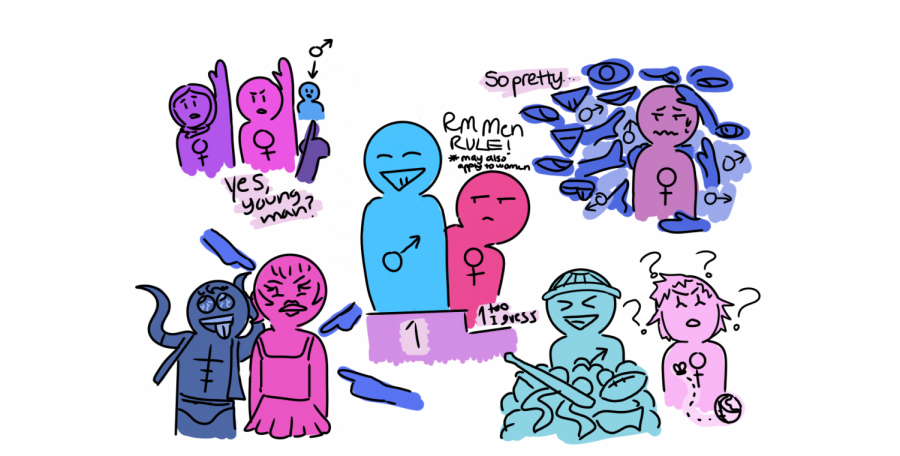Misogyny at RM: Young Female Students Must Be Protected
Graphic courtesy of Matthew Adjodh
Men and Women are not treated equally at RM, even if this sexism is often displayed through microaggressions.
March 2, 2021
In Richard Montgomery halls, sexist remarks do not go unheard by female students. In fact, demeaning comments are just fragments of the misogynistic ideals present in schools.
It is undeniable that gender equality has come a long way. Still, to truly achieve a safe and fair environment for women, Richard Montgomery needs to address their dismissive approach to sexism. Sexist stereotypes are subtly integrated into lessons, casual language, and behaviors at Richard Montgomery. Though it may be normalized, misogyny in high school is incredibly damaging to young female students’ security, respect, and mental health.
From sexist stereotypes down to sexual harassment, countless girls at Richard Montgomery have had their fair shares of misogyny in the building. This discrimination is so unregulated that it has become a commonality, creeping into everyday conversations.
Sexist jokes, littered with stereotypes, are so frequent, they are done inadvertently. “There are some boys who just don’t care,” sophomore Charlotte Cole said. “They talk about girls’ bodies and make disturbing jokes all the time.” With apathetic regard towards misogyny, this harmful language will persist, silencing young female voices along the way.
Sadly, verbal abuse is not the only thing that girls face. According to the Educational International Research Institute, nearly a quarter of girls in mixed-sex schools have experienced unconsented touching of a sexual nature. Many female students at Richard Montgomery have been victims of that same harassment.
Some boys think they are entitled to girls’ bodies, and their actions are not as reprimanded as they should be. “Some guys don’t take it seriously, but it is,” said senior Jack Orcev. “They violate girls and get away with it.”
“Boys will be boys” is the instinctual response to harassment reports. This phrase, deeply rooted in misogyny, condones boys’ malicious actions by protecting them from taking accountability. The damaging narrative somehow justifies inexcusable behavior. It gives off the message that taking advantage of women is okay and shows an immense disregard for young girls’ well-being.
At Richard Montgomery, these instances must not be shoved aside. Protecting young female students from harassment must be made a priority. If action is not taken, the dire effects of gender discrimination will never subside.
Misogyny places a psychological toll on girls, especially at such a young age. When faced with discrimination left and right, young female students become less and less confident.
Ultimately, girls will be discouraged from reaching their full potential without support inside and outside the classroom. “Especially because our students are heading towards their professional lives, one of my concerns or I fear that they take that and internalize it, and it stops them from whatever their next steps might be,” English teacher Marcy Fine said.
Casual sexist jokes and harassment in the building should not be tolerated any longer, as their effects last years after graduation. To protect the future of young female students, Richard Montgomery must properly combat misogyny. As a community, these issues must be addressed, and girls’ voices must finally be heard.
Richard Montgomery High School should not be a place of discrimination. Aspiring young female students should not be succumbed to double standards or placed in harmful situations. They deserve a safe and equal environment as their male peers.
To bring Richard Montgomery closer to gender equality, staff and students must advocate for women’s fair treatment and respect inside and outside the building. Young girls’ voices cannot be drowned out by excuses any longer. Once you listen to your female students, perhaps those gender barriers can finally be broken.



